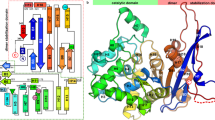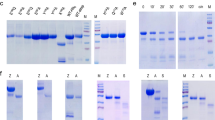Abstract
RELEVANT to the discussion which has taken place recently between Chibnall1 and Kögl and Erxleben2,3 are some facts which I have accumulated in an analysis of gliadin. Kögl and Erxleben find that the glutamic acid derived from the proteins of malignant tissue is partially racemized and suggest that this might be a characteristic of such proteins. Chibnall found tumour proteins to contain the bulk of their glutamic acid in the ordinary active form with [α]D + 31·6° in 9 per cent hydrochloric acid, and he thought that any racemization was incidental to the methods employed in its isolation. The work described here indicates that a vegetable protein such as gliadin also contains part of its glutamic acid in a racemic form, and that it is probably a general characteristic of proteins and not of special significance for the proteins of tumours.
This is a preview of subscription content, access via your institution
Access options
Subscribe to this journal
Receive 51 print issues and online access
$199.00 per year
only $3.90 per issue
Buy this article
- Purchase on Springer Link
- Instant access to full article PDF
Prices may be subject to local taxes which are calculated during checkout
Similar content being viewed by others
References
NATURE, 144, 71 (1939).
Z. physiol. Chem., 258, 57 (1939).
NATURE, 144, 111 (1939).
Author information
Authors and Affiliations
Rights and permissions
About this article
Cite this article
TOWN, B. Glutamic Acid of Proteins. Nature 145, 312–313 (1940). https://doi.org/10.1038/145312b0
Issue Date:
DOI: https://doi.org/10.1038/145312b0
This article is cited by
-
Der Enzymatische Abbau von 1-Aminosäuren
Klinische Wochenschrift (1943)
Comments
By submitting a comment you agree to abide by our Terms and Community Guidelines. If you find something abusive or that does not comply with our terms or guidelines please flag it as inappropriate.



